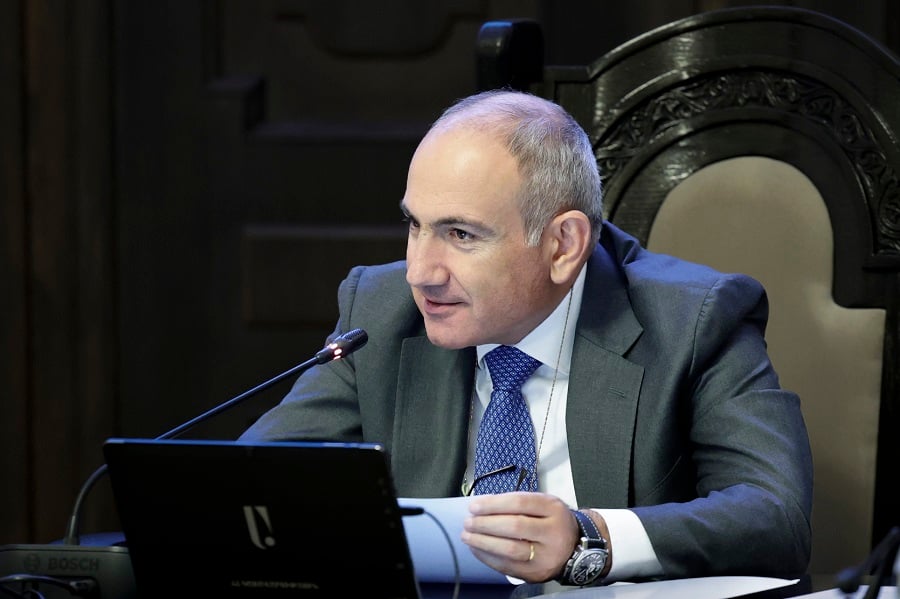Today, the regular Cabinet meeting was held, chaired by the Prime Minister of the Republic of Armenia Nikol Pashinyan. Nikol Pashinyan referred to the agricultural indicators of the first quarters of this year and emphasized that an increase was recorded in the volume of agricultural production.
Minister of Economy Gevorg Papoyan presented details: in the case of agriculture, a 7.3 percent growth was recorded in the first half of the year, in the case of crop production – 13.4 percent, in the case of livestock – 3 percent, and this is also the highest indicator in recent years.
The Prime Minister emphasized that according to the data for the first 7 months, a 7 percent economic activity growth was recorded. Moreover, a fairly good growth rate is recorded in the main branches of the economy. “According to the data of recent months, the economic activity indicator shows certain acceleration trends, because in July we had an economic activity indicator of 9.1. Of course, the number of manufacturing industries is of some concern according to the data for 7 months. But here there are processes related to re-export, which have changed, in July we had a 4.2 percent growth in industry. Industry has traditionally been one of our weakest points, but I think that political and regional processes, including the expected lifting of the blockade from Armenia, should also bring new quality and a new dimension to industry,” said Nikol Pashinyan.
In this regard, the Prime Minister emphasized that as of August 28, 2025, the Republic of Armenia is at the historically highest point of prosperity. “I am not saying this as something extraordinary, because the logic of any of our development is that at any point in each subsequent year we should have the highest level of our prosperity,” the Prime Minister said.
Read also
Nikol Pashinyan also noted that public welfare data is also visible from the data of the banking system. In particular, for example, bank deposits and accounts of citizens considered residents of the Republic of Armenia increased by 141 percent compared to 2017. That is, we are talking about money. In the case of individuals, accounts and deposits increased by 125 percent, in the case of legal entities, accounts, turnover by 175 percent compared to 2017. “Compared to 2017, loans granted to residents of Armenia increased by 173 percent. That is, from 2.3 trillion to 6.4 trillion. There may be a reaction here that people have fallen under credit or debt, but that is why there is another indicator. In terms of problematic loans, non-performing loans, we are at a historical minimum. Today, 1.2 percent of our loans are problematic, while in 2016 this indicator was 4.6 percent. Since 2024, this indicator has essentially halved and is now on a stable trajectory,” the Prime Minister said.
Nikol Pashinyan also emphasized that since 2018, the volume of investments made by owners in the banking system has increased by about 162 percent, which means that the banking system has become that much more reliable, and banking has become more attractive in Armenia.
“Agriculture, economic activity indicators, the banking system – all this indicates sustainable development. The established peace will add to this and give a new impetus to all this. And all the goals that we set at the political level are becoming more and more achievable, and behind all these indicators are specific people – working people, people who create results. I want to thank all these people again, because our job is to create a sufficient, proper environment and conditions so that people can work and create results and, of course, pay the taxes according to the law, and I thank all those people who do so,” the Prime Minister said.
Touching upon the shadow economy, the Prime Minister emphasized the importance of the effectiveness of the tools aimed at reducing it. Summing up, the Prime Minister emphasized that both the banking system and the economy must set and prepare and gain knowledge to develop in conditions of peace.
The government approved the measure for organizing the tomato procurement process in 2025. It is conditioned by the need to support the organization of the tomato procurement process in the current year. The decision proposes to provide support to economic entities carrying out tomato procurement for the production of tomato paste for the organization of the tomato procurement process in 2025, under the following conditions: No subsidy is provided to economic entities carrying out tomato procurement up to 2,000 tons, and support in the amount of 10 drams is provided for each 1 kg of purchased tomatoes exceeding 2,000 tons. A prerequisite for providing support is that the minimum price of purchased tomatoes cannot be lower than 40 drams, and that the entire volume of tomatoes must be purchased.
The government approved the program for the development of amateur sports in the communities of Ararat, Yeghegnadzor and Martuni. According to the substantiation, as a result of numerous joint discussions, the Hills Center gave its consent to the implementation of the program, with which a memorandum of cooperation was signed. The program envisages the construction of three sports complexes in these communities with funds provided from the state budget. Nikol Pashinyan, emphasizing the importance of the initiative aimed at developing a healthy lifestyle in the regions of the Republic of Armenia, considered the program a turning point. In this context, the Prime Minister emphasized the importance of cooperation with the private sector in order to increase the competitiveness and attractiveness of conditions.
By the government decision, 2 billion 117 million drams will be allocated for co-financing subsidy programs aimed at developing the republic’s infrastructure. The decision will allocate money for 27 subsidy programs in 19 communities.
The Office to the Prime Minister of the Republic of Armenia
























































